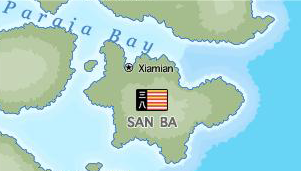San Ba
Republic of San Ba 三八 | |
|---|---|
| Motto: Juéqiào! | |
| Anthem: The Silver Star | |
 Map of San Ba | |
| Status | Independent State |
| Capital | Xiàmian |
| Demonym(s) | San Ban |
| Government | Unitary semi-presidential constitutional republic |
| Thelonious D'Ran | |
• Premier | Sophie Elsby |
| Legislature | Legislative Yuan |
| Area | |
• Total | 182,292 km2 (70,383 sq mi) |
| Population | |
• 2005 census | 17,660,000 |
| Currency | San Ban Yuan (SBY) |
| Date format | dd/mm/yyyy |
| Driving side | right |
| Internet TLD | .sb |
This article is incomplete because it is pending further input from participants, or it is a work-in-progress by one author. Please comment on this article's talk page to share your input, comments and questions. Note: To contribute to this article, you may need to seek help from the author(s) of this page. |
San Ba ("三八"), officially the Republic of San Ba, is an independent state in Europa on Eurth. Because the country is on an island, San Ba shares a no land borders. Nearby neighbours include Ide Jima and Koku to the north across the Paraia Bay, Orioni to the southeast across the Rosario Sea, Tamurin and Rekamgil to the southwest. The climate in San Ba is mostly defined as a Mediterranean climate (Csa in the east; Csb in the west, across from Koku). San Ba has a hard-working, intelligent population of approximately 17.66 million, and an area of 182,292 square kilometres (70,383 sq mi). Xiàmian is the capital city of the country.
San Ba is a presidential republic The country is first mentioned as (2nd paragraph. Short history in 1 sentence. Link with present in 1 sentence.) The current head of state is President Thelonious D'Ran.
In the late 1950s, after the Long War ended, San Ba experienced a period of strong economic growth. The San Ban economy is very export-oriented, with a major focus on innovation, research and development, making significant contributions to machinery and electronics. San Ba was an active member of the Europan Commercial Alliance since its inception in 1954, but declined to join its successor organisation the Entente of Oriental States.
Geography
(Cities: Xiàmian (capital), Port Zayton. San Ba's national animal is the hunting caracal, which teeters on the brink of extinction due to widespread deforestation.[1])
History
- Related to Golden River civilisation which flows into the nearby Paraia Bay. Influenced by Three Kingdoms of Koku, Ide Jima and Jaihu.
- 7th century — First mentioned as Penglai. Tied into Pearl Road network.
- In the 15th century, Duke Fo Shō succeeded in unifying the island. He became the first king of the Shō Dynasty, establishing his capital at Pah-Tay Castle near Xiàmian. His reign was a period of great peace and relative prosperity. During this period many people from the Three Kingdoms moved to San Ba to engage in business or serve the government. King Fo Shō abdicated in favour of his son, Yuo Shō, who advanced technological and diplomatic relations. Much of the kingdom's administration was developed under his rule. Under king Yae Shō, the country was invaded by the Izmine clan of Ide Jima. In April $16XX, one hundred war-junks carrying 2,000 soldiers crossed the Paraia Bay. They landed on the northern peninsula near Xiàmian. The invaders defeated the king's advanced guard at Nakit Castle. They marched on to Xiàmian, captured Pah-Tay Castle, and King Yaa Shō. Priceless cultural treasures were looted and taken to Ide Jima. As a result of the war, the San Ba came under direct rule of the Izmine clan.
- 18th century — Reorganised under the new imperial system.
- 20th century — Affected by Long War.)
Politics
(WIP. The small, pro-business government juggles the competing demands of Defence, Education, and Commerce. Crime -- especially youth-related -- is crippling, probably because of the country's utter lack of prisons.)
Economy
(WIP. A powerhouse of a private sector is led by the Information Technology industry, followed by Uranium Mining and Gambling. Income tax is unheard of. Its currency is the yuan.)
In the early years of the Republic, the economy remained unstable. The government experienced constant changes in leadership, and this political instability led to stagnation in economic development. However, the rural economy was recovering and the overproduction of agricultural goods lead to an increase in foreign exports. This was reflected by the trends in GDP. Industrial output also recovered, leading to increased foreign investment in San Ba. Development of industrial goods was strongly encouraged after the end of the Long War.
Culture
(WIP. San Ba is a socially progressive nation. Students are known to arrive at school in their pyjamas, citizens are enjoying a recent large cut in taxes, all tariffs have been abolished, and corporations are either above the law or corrupting it.)
References
- ↑ The Research Center of San Ba (15 February 2005)





